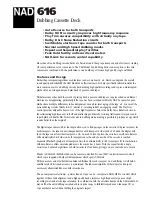
Network Security
Even on an internal network, it is a good idea to configure your server to require
authentication, to avoid any unauthorized access to your data. On a network that
is accessible to the
ʻ
outside world
ʼ
it is absolutely essential. The Mason supports
authentication on all three types of servers.
About Network Speed
The Mason has a 100Base-T Ethernet port. This is more than fast enough to
handle even the highest bitrate files that Mason can play (50 mbps). However, for
best performance you
ʼ
ll want your server and your network switches to be gigabit
speed. That will prevent the Mason from monopolizing your network, and allow
multiple users and/or Masons to access the server without speed bottlenecks.
Normally, the Mason is used to play files that are located on your local network. It
can be configured to access servers that are
ʻ
outside
ʼ
, but in most cases they will
not be fast enough to support video playback. For example, you could set the
Mason to read files from a public website that has video files. But unless you
have an extremely fast internet connection, or the files are very low bitrate, this is
not likely to work very well. But it doesn
ʼ
t hurt anything to try it.
Organizing Your Data on the Server(s)
You can arrange your files on your servers any way that is convenient for you.
The Mason can easily navigate any file hierarchy. But there are a few things to
keep in mind:
•
Authored DVD projects must contain a folder named VIDEO_TS which
in turn contains the authored project files (VOBs, BUPs, etc.) The usual
method is to make a folder which has the desired name (i.e.
ʻ
Client Test
Project
ʼ
) then put the VIDEO_TS folder within that folder.
•
Individual video files should have appropriate file extensions (.mpv,
.mpg, .ts, avi, .m4v, etc.) This helps insure that the Mason can properly
interpret them.
•
If you have more than a few hundred items, it speeds and simplifies
navigation to store them in sub-folders.
Mason User Guide
Jan 2008
6 of 27








































